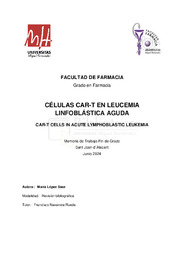Por favor, use este identificador para citar o enlazar este ítem:
https://hdl.handle.net/11000/32719Células Car-T en leucemia linfoblástica aguda. Car-T cells in acute lymphoblastic leukemia
| Título : Células Car-T en leucemia linfoblástica aguda. Car-T cells in acute lymphoblastic leukemia |
| Autor : López Sáez, María |
| Tutor: Navarrete Rueda, Francisco |
| Editor : Universidad Miguel Hernández |
| Departamento: Departamentos de la UMH::Farmacología, Pediatría y Química Orgánica |
| Fecha de publicación: 2024-05-18 |
| URI : https://hdl.handle.net/11000/32719 |
| Resumen : La leucemia linfoblástica aguda (LLA) es el tipo de cáncer más frecuente en la edad pediátrica pero también puede presentarse en otro rango de edades. Los pacientes que padecen esta enfermedad rara vez consiguen alcanzar una remisión completa durante toda la vida. Este cáncer tiene su origen en la médula ósea, afecta a las células del linaje linfoide y se reproduce de una manera muy rápida. Numerosas terapias como la quimioterapia o los anticuerpos monoclonales, incluso el trasplante de médula ósea, han intentado controlar las células cancerígenas que produce la LLA, pero, hasta el momento, ninguna había tenido unos resultados tan esperanzadores como los que ha demostrado la terapia con células CAR-T dirigidas a CD19, comercializado como Tisagenlecleucel. Uno de los objetivos principales de esta memoria de trabajo de finde grado es clarificar y actualizar los datos sobre la eficacia y la seguridad de la terapia de células con CAR-T en el tratamiento de la LLA de pacientes en recaída o refractarios con más de dos líneas de tratamiento previas y que por sus características son elegibles para favorecerse de esta terapia. Para ello se ha llevado a cabo una búsqueda bibliográfica en las bases de datos Medline, a través de su buscador Pubmed, y ClinicalTrials.gov. Se han recopilado los resultados de eficacia y seguridad del Tisagenlecleucel, comparando también con las terapias que se han usado convencionalmente para el tratamiento de la LLA con el objetivo de evidenciar las ventajas y/o inconvenientes de esta nueva estrategia terapéutica. Atendiendo a los resultados obtenidos hasta la fecha podemos establecer que la terapia con células CAR-T es una terapia innovadora que presenta grandes resultados en el tratamiento de la LLA y puede ser un tratamiento muy favorable para los pacientes que cumplan los requisitos para su uso. Sin embargo, la fabricación, logística, personal, etc, son aspectos todavía limitantes y hace falta tener conocimientos muy especializados sobre esta terapia y un equipo multidisciplinar muy bien formado para que todos los pasos previos a la infusión del fármaco se desarrollen correctamente y se puede garantizar la máxima eficacia y seguridad al paciente que reciba el tratamiento. Acute lymphoblastic leukemia (ALL) is the most common type of cancer in the pediatric age group but can also occur in other age ranges. Patients with this disease rarely achieve complete remission throughout their lives. This cancer originates in the bone marrow, affects cells of the lymphoid lineage and reproduces very rapidly. Numerous therapies such as chemotherapy or monoclonal antibodies, including bone marrow transplantation, have attempted to control the cancer cells that produce ALL, but, until now, none have had such encouraging results as those demonstrated by therapy with CAR-T cells targeting CD19, marketed as Tisagenlecleucel. One of the main objectives of this thesis is to clarify and update the data on the efficacy and safety of CAR-T cell therapy in the treatment of ALL in relapsed or refractory patients with more than two previous lines of treatment and whose characteristics make them eligible to benefit from this therapy. To this end, a bibliographic search was carried out in the Medline database, through its Pubmed search engine, and ClinicalTrials.gov. The efficacy and safety results of Tisagenlecleucel have been compiled and compared with the therapies that have been conventionally used for the treatment of ALL in order to demonstrate the advantages and/or disadvantages of this new therapeutic strategy. Based on the results obtained to date, we can establish that CAR-T cell therapy is an innovative therapy that shows great results in the treatment of ALL and can be a very favorable treatment for patients who meet the requirements for its use. However, manufacturing, logistics, personnel, etc., are still limiting aspects and it is necessary to have very specialized knowledge about this therapy and a very well trained multidisciplinary team so that all the steps prior to the infusion of the drug are carried out correctly and maximum efficacy and safety can be guaranteed for the patient receiving the treatment. |
| Palabras clave/Materias: leucemia linfoblástica aguda (LLA) terapia con células CAR-T tisagenlecleucel eficacia y seguridad del Tisagenlecleucel terapias convencionales |
| Área de conocimiento : CDU: Ciencias aplicadas: Medicina: Farmacología. Terapéutica. Toxicología. Radiología |
| Tipo de documento : info:eu-repo/semantics/bachelorThesis |
| Derechos de acceso: info:eu-repo/semantics/openAccess Attribution-NonCommercial-NoDerivatives 4.0 Internacional |
| Aparece en las colecciones: TFG - Farmacia |
 La licencia se describe como: Atribución-NonComercial-NoDerivada 4.0 Internacional.
La licencia se describe como: Atribución-NonComercial-NoDerivada 4.0 Internacional.
.png)
